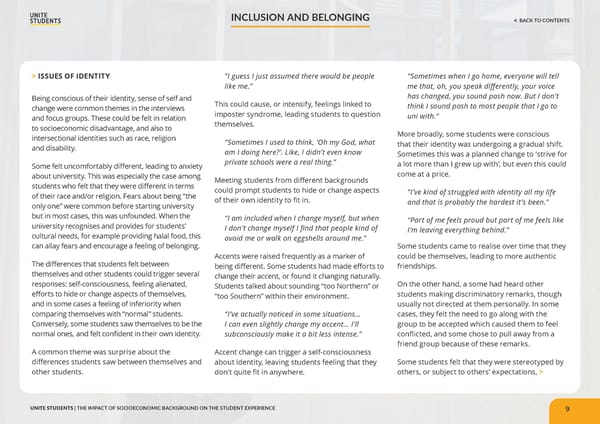< BACK TO CONTENTS UNITE STUDENTS | THE IMPACT OF SOCIOECONOMIC BACKGROUND ON THE STUDENT EXPERIENCE > ISSUES OF IDENTITY Being conscious of their identity, sense of self and change were common themes in the interviews and focus groups. These could be felt in relation to socioeconomic disadvantage, and also to intersectional identities such as race, religion and disability. Some felt uncomfortably different, leading to anxiety about university. This was especially the case among students who felt that they were different in terms of their race and/or religion. Fears about being “the only one” were common before starting university but in most cases, this was unfounded. When the university recognises and provides for students’ cultural needs, for example providing halal food, this can allay fears and encourage a feeling of belonging. The differences that students felt between themselves and other students could trigger several responses: self-consciousness, feeling alienated, efforts to hide or change aspects of themselves, and in some cases a feeling of inferiority when comparing themselves with “normal” students. Conversely, some students saw themselves to be the normal ones, and felt confident in their own identity. A common theme was surprise about the differences students saw between themselves and other students. “I guess I just assumed there would be people like me.” This could cause, or intensify, feelings linked to imposter syndrome, leading students to question themselves. “Sometimes I used to think, ‘Oh my God, what am I doing here?’. Like, I didn’t even know private schools were a real thing.” Meeting students from different backgrounds could prompt students to hide or change aspects of their own identity to fit in. “I am included when I change myself, but when I don’t change myself I find that people kind of avoid me or walk on eggshells around me.” Accents were raised frequently as a marker of being different. Some students had made efforts to change their accent, or found it changing naturally. Students talked about sounding “too Northern” or “too Southern” within their environment. “I’ve actually noticed in some situations… I can even slightly change my accent… I’ll subconsciously make it a bit less intense.” Accent change can trigger a self-consciousness about identity, leaving students feeling that they don’t quite fit in anywhere. “Sometimes when I go home, everyone will tell me that, oh, you speak differently, your voice has changed, you sound posh now. But I don’t think I sound posh to most people that I go to uni with.” More broadly, some students were conscious that their identity was undergoing a gradual shift. Sometimes this was a planned change to ‘strive for a lot more than I grew up with’, but even this could come at a price. “I’ve kind of struggled with identity all my life and that is probably the hardest it’s been.” “Part of me feels proud but part of me feels like I’m leaving everything behind.” Some students came to realise over time that they could be themselves, leading to more authentic friendships. On the other hand, a some had heard other students making discriminatory remarks, though usually not directed at them personally. In some cases, they felt the need to go along with the group to be accepted which caused them to feel conflicted, and some chose to pull away from a friend group because of these remarks. Some students felt that they were stereotyped by others, or subject to others’ expectations, > INCLUSION AND BELONGING 9
 "A Different World": The Impact of Socioeconomic Background on the Student Experience Page 8 Page 10
"A Different World": The Impact of Socioeconomic Background on the Student Experience Page 8 Page 10